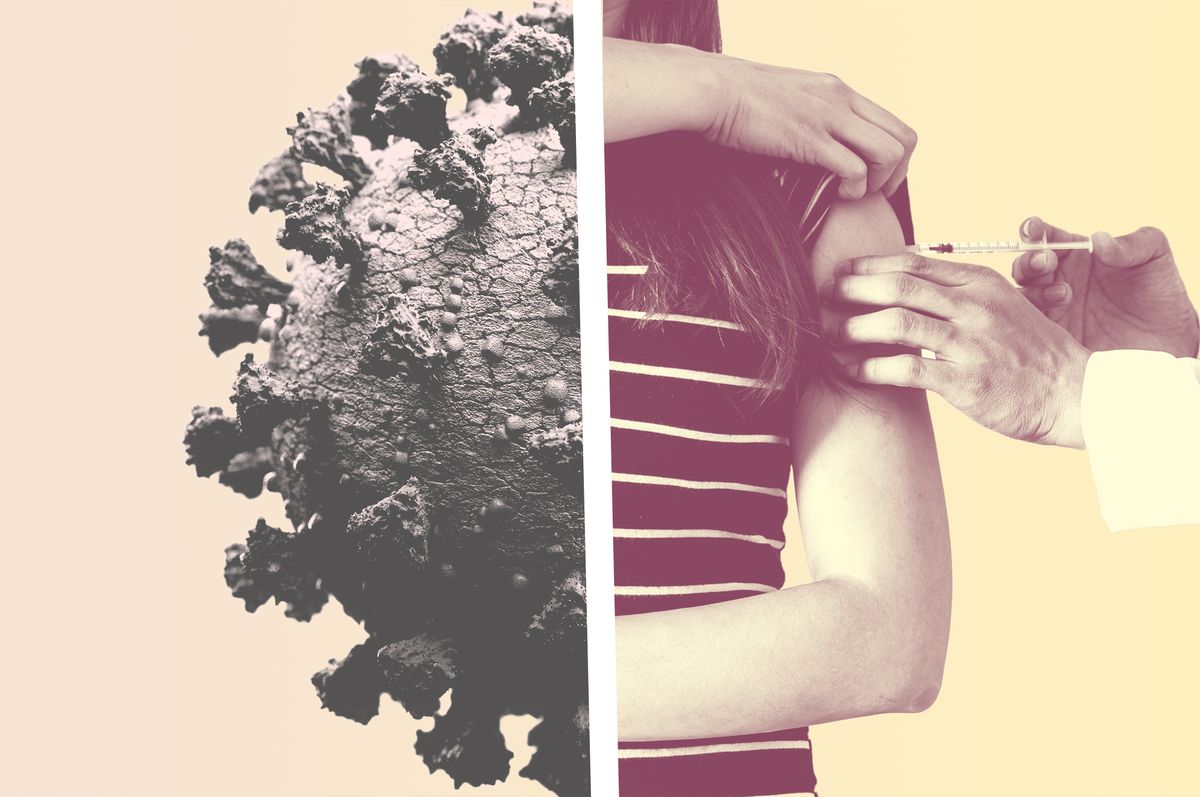
The first COVID-19 vaccine shots in the US were administered on December 14 to high-risk health care workers, marking the start of an ambitious immunization program that aims to give every American the option of receiving the vaccine. But what about people who've already been infected with COVID-19—should they also get the vaccine?
According to the Advisory Committee on Immunization Practices (ACIP), the independent committee that advises the Centers for Disease Control and Prevention (CDC) on how best to control vaccine-preventable diseases in the US, a previous COVID-19 infection shouldn't rule out a person from getting the vaccine. In a slide presentation for a CDC meeting on December 12, the committee noted that data from clinical trials suggests that vaccination is "safe and likely efficacious" in people who have previously been infected with COVID-19, whether they displayed symptoms or not.
But don’t people who’ve had COVID-19 have immunity?
Yes, sometimes. The problem is that the level of immunity (as determined by the level of antibodies) varies greatly between people who've been previously infected, Stephen Russell, MD, PhD, CEO and co-founder of Imanis Life Sciences, tells Health. "Higher levels of neutralizing antibodies provide better protection against new infection," explains Dr. Russell. "More severe symptoms of infection often lead to higher levels of neutralizing antibodies, while less severe symptoms may lead to lower or no measurable neutralizing antibody production."
In other words, if you had a very mild COVID-19 infection, your immune system may not have formed enough antibodies. And the same can be true for those who experienced a more severe form of the disease. A study published in Frontiers in Immunology in May 2020 found that the COVID-19 infection was so overpowering in hospitalized patients that their immune response became exhausted, and immune memory to the virus wasn't adequately formed.
More evidence is needed to determine the risk of reinfection in previously infected people, as well as how long their protective immunity lasts. "One possible scenario is that a booster vaccine will be given to previously infected people six months after their original episode of COVID-19, but first we need more information on the speed at which immunity declines after natural infection," Dr. Russell says.
He adds that protection and immunity due to neutralizing antibodies may weaken and eventually disappear over time. "Significant reductions in neutralizing antibodies are seen even within the first few months after recovery from a COVID-19 infection," he says. This suggests that vaccination could be beneficial, regardless of whether you had a mild or severe form of COVID-19.
How does the vaccine affect people who’ve already had COVID-19?
So far, vaccine trials have concentrated on people who haven't been exposed to COVID-19, so it's still unclear what the effect of vaccination will be on those who have been exposed.
"The COVID-19 vaccine triggers an immune response to the Spike protein—the red 'broccoli stalk'-like projections as depicted on the surface of each virus that we can 'measure' by looking for COVID-19 antibodies after vaccination," Charles Bailey, MD, medical director for infection prevention at Providence St. Joseph Hospital and Providence Mission Hospital in Orange County, California, tells Health. These antibodies should be protective for a period of time by preventing or lessening symptoms of a subsequent COVID-19 infection, Dr. Bailey explains. And while "period of time" isn't well-defined right now, he says it's likely to be at least three months, and maybe much longer.
When people who've already had COVID-19 get vaccinated, their immunity is effectively topped up, meaning they're hopefully protected for longer. And even after people have been vaccinated, it's possible they'll need additional booster doses to keep their immunity up. "Discussions are ongoing regarding the possible need for high-risk individuals to receive booster vaccinations every six or 12 months, but more data is needed before we have clarity on this question," Dr. Russell says.
What if you have COVID-19 when you’re due to get the vaccine?
The ACIP recommends that vaccination should be deferred until you've recovered from acute illness (if you're experiencing symptoms), and you've completed the isolation period. For most people, that's 10 days after the onset of symptoms, provided there's been no fever for at least 24 hours, per CDC guidelines.
The committee also notes that current evidence suggests that COVID-19 reinfection is uncommon in the 90 days after initial infection, so people with documented acute infection in the preceding 90 days may delay the vaccine until the end of this period, if they wish.
Is there a way to test how long immunity to Covid lasts?
Yes, by repeatedly measuring patients' neutralizing antibodies. "We can do this every few months using a quantitative neutralizing antibody test, such as a PRNT or IMMUNO-COV™," Dr. Russell says. "These tests measure virus-neutralizing antibodies—the ones that can stop SARS-CoV-2 infection from taking hold and spreading in the body—and evaluate the level, thereby assessing the strength and durability of the person's immunity to COVID-19 over time."
This could be a helpful way of prioritizing vaccine distribution while supplies are limited, Dr. Russell adds—vulnerable people with the lowest antibody levels could go to the front of the line.
The information in this story is accurate as of press time. However, as the situation surrounding COVID-19 continues to evolve, it's possible that some data have changed since publication. While Health is trying to keep our stories as up-to-date as possible, we also encourage readers to stay informed on news and recommendations for their own communities by using the CDC, WHO, and their local public health department as resources.
Source: Read Full Article
